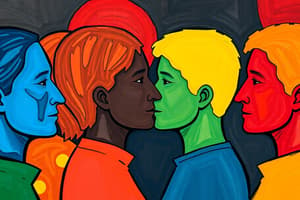Podcast
Questions and Answers
What defines a formal group?
What defines a formal group?
- Individuals who meet socially for leisure activities.
- Any collection of people with common interests.
- A group that exists without any specific objectives.
- A set of individuals working together to achieve an organizational goal. (correct)
What is ingroup favoritism?
What is ingroup favoritism?
- Evaluating oneself based on known social standards.
- The tendency to favor individuals from different groups.
- The belief that all groups should coexist without hierarchy.
- Seeing members of one's own group as superior to others. (correct)
What does social identity threat refer to?
What does social identity threat refer to?
- Believing one will be judged negatively based on group membership. (correct)
- Feeling embarrassment due to a group failure.
- The desire to distance oneself from a negative group.
- The awareness of one's status within a group.
What illustrates role conflict?
What illustrates role conflict?
What is a psychological contract?
What is a psychological contract?
What causes social loafing in team settings?
What causes social loafing in team settings?
Which of the following best describes norms within a group?
Which of the following best describes norms within a group?
What is deviant workplace behavior?
What is deviant workplace behavior?
What characterizes the punctuated-equilibrium model?
What characterizes the punctuated-equilibrium model?
What influences role perception?
What influences role perception?
Flashcards
Group
Group
Two or more individuals working together to achieve a common objective.
Formal Group
Formal Group
Individuals work together to achieve an organization's goals. Their behavior is determined by the organization.
Informal Group
Informal Group
Individuals meet socially due to the need for social contact; their interactions can affect behavior and performance.
Social Identity Theory
Social Identity Theory
Signup and view all the flashcards
Ingroup Favoritism
Ingroup Favoritism
Signup and view all the flashcards
Outgroup
Outgroup
Signup and view all the flashcards
Social Identity Threat
Social Identity Threat
Signup and view all the flashcards
Punctuated-Equilibrium Model
Punctuated-Equilibrium Model
Signup and view all the flashcards
Role
Role
Signup and view all the flashcards
Psychological Contract
Psychological Contract
Signup and view all the flashcards
Study Notes
Groups and Group Dynamics
- Groups are composed of two or more individuals working towards a shared objective, which can be formal or informal.
- Formal groups work towards organizational goals, guided by organizational expectations.
- Informal groups form due to social needs, influencing members' behaviour and performance.
- Social Identity Theory explains emotional responses to group success/failure, as seen in sports fans.
- Ingroup favoritism is the tendency for group members to view their own group more positively than other groups.
- Outgroup refers to a group perceived as opposite or antagonistic to the ingroup.
- Social identity threat is the belief that one will be judged negatively based on their group affiliation.
Group Models and Processes
- Punctuated-equilibrium model describes a group's progression through phases of inertia and activity, leading to transitions.
- Roles are sets of behaviours associated with social positions (e.g., husband, specific job role).
- Role perception is the individual's understanding of what is expected of them in a specific role.
- Role expectation is the perception of others regarding the behaviours expected of a specific role.
- Psychological contract is an unwritten agreement between employees and employers defining expectations.
Organizational Behaviour and Group Issues
- Role conflict arises when individuals face differing expectations for different roles they hold.
- Norms are shared expectations regarding acceptable behaviour within a group.
- Deviant workplace behaviour is voluntary behaviour violating organizational norms (e.g., working slowly).
- Social loafing is the tendency to exert less effort when working in a group.
- Group cohesiveness is the degree to which members feel connected and trust each other.
- Groupthink is a phenomenon where the desire for group consensus overrides critical evaluation.
- Groupshift refers to the tendency for group decisions to be more extreme than individual decisions.
Studying That Suits You
Use AI to generate personalized quizzes and flashcards to suit your learning preferences.




